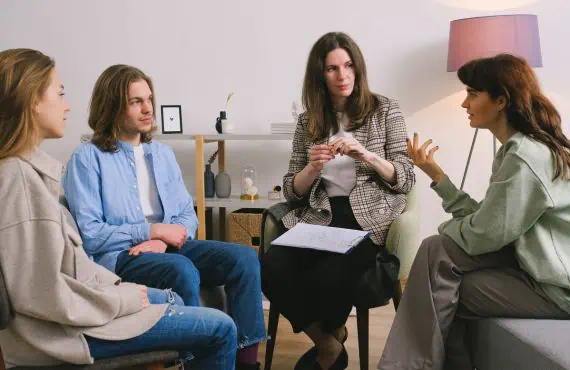Depression is no joke. No, we are not making light of this serious mental health issue that impacts not just the people going through it but their loved ones, too. Depression sucks. And when one person in a romantic relationship is depressed, it can make communicating, being intimate, and just being happy together way harder, and figuring out how to handle depression together, whether you have it or your partner does (or you both do), is key for keeping your relationship healthy.
Depression in relationships may be a common issue for a lot of couples, but that doesn’t make it any easier. But there is hope, which is why we are going to examine the coping and connecting aspects when it comes to your partnership.
How Depression Impacts Relationships
Depression isn’t just feeling bummed out or sad for a bit, and then they magically snap out of it–it’s a serious health issue that about 264 million people around the world deal with, according to the World Health Organization.
When someone’s depressed, they might get irritable, want to be alone more, lose interest in the things they used to have fun doing, and their sex drive can plummet. This can make you feel neglected or like your partner doesn’t care, which puts a huge strain on your romantic relationship.
It’s important to recognize depression symptoms–this can manifest as constant sadness, sleeping and eating more or less, low or no energy, feelings of worthlessness, and having trouble focusing. Recognizing and acknowledging these signs can help you not just be more understanding of what your partner’s going through but also put you on the right road to getting help.
How Couples Can Deal
Open and transparent communication is so important! A recent study in the Journal of Family Psychology showed that couples who talk openly about challenges, including mental health issues, tend to have higher relationship satisfaction.
- It’s important to understand that one partner can’t cure the other’s depression, so don’t even try or bring it up. However, being supportive, patient, and understanding can make a big difference. All you can do is encourage your partner to get professional help and be there for them.
- Creating an environment that promotes wellness is crucial–this means establishing routines such as healthy eating, encouraging activity, and suggesting mood-boosting and bonding activities, like simply taking a walk to get some fresh air.
- Doing things as a couple can strengthen your bond, whether cooking meals together or simply watching a movie or TV show while snuggling on the couch. Any kind of shared activity can strengthen your connection and bring back a sense of normalcy.
- Depression can severely impact intimacy–your libido takes a bit hit. But you have to prioritize emotional and physical intimacy (within comfortable boundaries, obviously) because it is important. Simple acts of affection, like holding hands or hugging, can bolster closeness.
- Going to therapy together can also help facilitate understanding and improve communication strategies–focus on supporting them rather than fixing one another.
- Couples counseling can also help couples having issues caused by depression. Therapists can assist couples in improving communication, understanding, and emotional bonds between partners.
- The partner who is not suffering from depression also needs to take care of themselves, and this means keeping up their friendships, doing the things that they enjoy, and maybe even seeing a therapist on their own to process their own feelings about the situation.
Medical Intervention
Cognitive Behavioral Therapy (CBT) is a go-to treatment for depression used by mental health experts everywhere. It works by helping individuals identify and change negative thought patterns and behaviors that contribute to their depression. A meta-analysis published in the Journal of Consulting and Clinical Psychology found that CBT is particularly effective in not only reducing symptoms of depression but also in preventing relapse.
CBT can be beneficial in a relationship context as well. It assists individuals in developing healthier communication skills, fostering positive interactions, and mitigating conflicts exacerbated by depression. Couples can also engage in CBT together to improve their understanding of each other’s experiences and learn ways to support each other effectively.
Other Therapeutic Treatments
Interpersonal therapy (IPT) focuses on someone’s relationships and how those impact and are impacted by mood and behavior. This approach is particularly relevant for depression in relationships, as it addresses issues like role transitions, grief, and interpersonal disputes.
Psychodynamic Therapy
Psychodynamic therapy looks at how past experiences, especially from childhood, shape how we function now and in our current relationships. This goes a long way in helping people understand why they’re depressed and work through any unresolved past trauma or issues that might be affecting their relationships now.

Medication
In some situations, meds might be part of the plan for treating depression, and antidepressants can help balance out chemical levels in the brain that play into depression. It’s important for both people in the relationship to understand how these meds could impact things between them, so talking openly about how the meds are affecting things can help manage expectations as well as offer support to each other.
There are also holistic approaches like mindfulness, meditation, and yoga that can also work in tandem with regular therapy. These help connect the mind and body, reduce stress, help mood, and feel better overall.
Often, combining different therapies works best. For example, someone could do individual cognitive behavioral therapy but also do couples therapy–the key is customizing things to fit the unique needs and situations of both people.
NOTE: Always check with your doctor or healthcare professionals to figure out what treatment plan is right for your specific situation.
Takeaways
Dealing with depression in a relationship takes understanding, patience, and being proactive to cope and connect. By focusing on communication, supporting each other, doing things together, and getting professional help, couples can work through the challenges of depression as a team. Remember, getting help means you’re strong, not weak, and it’s an important step to feeling better–as an individual and as a couple.
